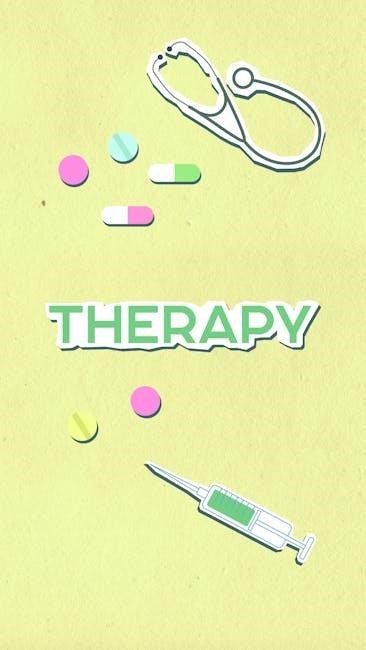A refusal of treatment form is a legal document where patients formally decline recommended medical tests or treatments, acknowledging the risks and consequences of their decision․

Overview of the Refusal of Treatment Form
A refusal of treatment form is a legal document that formally records a patient’s decision to decline specific medical tests, treatments, or procedures recommended by their healthcare provider․ It ensures that the patient acknowledges the potential risks and consequences of their choice․ The form typically includes details about the refused treatment, the patient’s understanding of the risks, and their signature confirming the decision․ This document is crucial for protecting both the patient’s autonomy and the healthcare provider’s legal standing․ It is widely used in hospitals, clinics, and other healthcare settings to document informed refusal․ Specific cases, such as minors or life-sustaining treatments, may require additional legal considerations․ In some regions, like South Korea, millions have used such forms to refuse life-sustaining treatments, highlighting its significance in end-of-life care decisions․
Purpose of the Refusal of Treatment Form
The primary purpose of a refusal of treatment form is to legally and ethically document a patient’s decision to decline recommended medical care, ensuring clarity and protection for all parties involved․ By signing this document, patients affirm that they have been fully informed about the potential risks and consequences of refusing treatment․ This form safeguards patient autonomy, allowing individuals to make decisions aligned with their personal beliefs, values, or medical preferences․ It also protects healthcare providers from potential liability by demonstrating that the patient’s choice was made with full understanding․ Additionally, this form facilitates clear communication between patients and healthcare providers, ensuring that all parties are aligned on the chosen course of action․ Its use is particularly significant in cases involving life-sustaining treatments, as seen in South Korea, where millions have utilized such forms to express their wishes regarding end-of-life care․

Legal Aspects of Refusal of Treatment
Legal aspects of refusal of treatment involve ensuring compliance with local laws, protecting patient rights, and defining healthcare provider responsibilities and liabilities in respecting patients’ decisions․

Legal Requirements for Refusal of Treatment
Legal requirements for refusal of treatment ensure that the process is lawful, protecting both patients and healthcare providers․ Patients must provide informed consent, acknowledging the risks of refusing treatment․ Written documentation is essential, with clear statements of refusal signed by the patient or their legal representative․ Witnesses, often required, must verify the patient’s capacity to make decisions․ Healthcare providers must ensure the patient understands the implications of their choice․ Specific laws vary by jurisdiction, such as age restrictions for minors in Russia and South Korea’s regulations on life-sustaining treatments․ Non-compliance with these requirements can lead to legal consequences․ These laws balance patient autonomy with medical and ethical responsibilities, ensuring refusal of treatment is handled respectfully and lawfully․
State-Specific Laws on Treatment Refusal
State-specific laws on treatment refusal vary significantly, impacting how refusal is documented and enforced․ In Russia, minors cannot legally refuse treatment before turning 18, as per Article 2019 legal updates․ South Korea allows individuals to sign refusal forms for life-sustaining treatments, reflecting cultural and ethical preferences․ In the U․S․, New York City Department of Correction cases highlight discrepancies in refusal documentation, particularly for detainees․ Additionally, the Mental Health Protection Act (MHPA) in some regions requires written applications for involuntary treatment but not for voluntary cases․ These laws emphasize the importance of informed consent and legal compliance․ Such variations necessitate tailored refusal forms to meet local regulations, ensuring patient autonomy while safeguarding healthcare providers from liability․ Understanding these laws is crucial for creating legally sound refusal documents that respect patient rights and adhere to jurisdictional requirements․
Implications of Refusing Medical Treatment
Refusing medical treatment can have significant health and legal implications․ Patients who decline recommended treatments may face increased risks of disease progression or complications․ For instance, inmates in New York City jails reportedly refused medical appointments without prior knowledge, highlighting potential gaps in communication․ In South Korea, over three million individuals have signed forms refusing life-sustaining treatments, reflecting ethical choices about end-of-life care․ These decisions often involve emotional and psychological burdens on patients and their families․ Legally, refusal forms must be properly documented to protect healthcare providers from liability․ Refusal of treatment can also limit future medical options, as certain conditions may become irreversible without timely intervention․ Ultimately, patients must weigh personal autonomy against potential health consequences, ensuring informed decisions are made with full understanding of the risks involved; This underscores the importance of clear communication between patients and healthcare providers․
Ethical Considerations in Treatment Refusal
Ethical considerations in treatment refusal involve balancing patient autonomy with potential health risks; Informed consent ensures patients understand the implications of their decisions, as seen in cases like South Korea’s dignified death choices․
Patient Autonomy and Informed Decision-Making
Patient autonomy is a cornerstone of ethical healthcare, emphasizing the right of individuals to make informed decisions about their own medical care․ This principle is central to refusal of treatment forms, as it ensures patients are fully aware of the implications of their choices․ Informed decision-making requires clear communication between healthcare providers and patients, ensuring that all relevant information, including treatment options, benefits, risks, and alternatives, is shared․ Patients must also be capable of understanding and appreciating the consequences of their decisions․ Respect for autonomy obligates providers to honor a patient’s decision, even if it contradicts medical recommendations․ Ethical frameworks underscore the importance of dignity, self-determination, and the patient’s right to prioritize personal values over medical outcomes․ This principle is particularly evident in cases involving advance directives or religious beliefs influencing treatment refusal․ Ultimately, upholding patient autonomy ensures that care remains patient-centered and ethically sound․
Medical Ethics and the Role of Healthcare Providers
Medical ethics play a pivotal role in refusal of treatment scenarios, guiding healthcare providers to balance patient autonomy with professional obligations․ Providers must respect patients’ rights to refuse treatment while ensuring they act in the patient’s best interests․ The principle of beneficence requires providers to promote well-being, while non-maleficence mandates avoiding harm․ When a patient refuses treatment, providers must ensure the decision is informed, voluntary, and free from coercion․ They are ethically bound to provide accurate information about potential outcomes and explore alternative options․ In cases where refusal may lead to significant harm, providers must document the decision thoroughly and consider legal or ethical consultations․ Ultimately, the role of healthcare providers is to support patients’ autonomy while upholding ethical standards and minimizing risks․ This balance ensures respectful, patient-centered care even when treatment is declined․

How to Create a Refusal of Treatment Form
Creating a refusal of treatment form involves including patient details, treatment description, refusal statement, witness signatures, and legal compliance․ Ensure clarity, accuracy, and professional review․
Essential Elements of a Refusal of Treatment Form

A refusal of treatment form must include clear patient identification, detailed description of the treatment being refused, and a statement acknowledging the refusal; It should outline the risks and consequences of refusing treatment, as disclosed by the healthcare provider․ The form must also include a section for the patient’s signature, witnessed by a third party, to confirm voluntary consent․ Additionally, it should specify the effective date and duration of the refusal․ Legal language ensuring compliance with state and federal laws is crucial․ The form should also provide space for the healthcare provider’s signature and any additional notes or recommendations․ Ensuring all elements are present makes the document legally binding and protects both the patient and provider․ Proper formatting and professional review are essential to maintain clarity and validity․
Standard Templates for Refusal of Treatment
Standard templates for refusal of treatment forms are widely available to ensure consistency and compliance with legal requirements․ These templates typically include pre-designed sections for patient information, treatment details, and clear statements of refusal․ They often incorporate checkboxes or fillable fields to outline specific treatments being declined, such as surgeries, medications, or life-sustaining interventions․ Many templates also include spaces for witness signatures and acknowledgments from healthcare providers․ Using a standard template helps ensure that all necessary legal and ethical elements are included, reducing the risk of errors or omissions․ Templates may vary slightly depending on the jurisdiction or medical facility but generally adhere to common legal standards․ They are often downloadable as PDFs from official medical or legal websites, making them easily accessible for patients and providers․ Using a standard template ensures clarity, professionalism, and enforceability of the refusal document․
Digital Solutions for Refusal of Treatment Forms
Digital solutions for refusal of treatment forms offer modern, efficient, and secure ways to manage these documents․ Electronic health record (EHR) systems often include templates for refusal of treatment forms, allowing patients and providers to complete and sign them electronically․ Digital signatures ensure authenticity and compliance with legal standards․ Many platforms also provide real-time sharing, enabling healthcare teams to access the document instantly․ Automated templates reduce errors and ensure all necessary information is included․ Additionally, digital storage solutions, such as cloud-based systems, provide secure and centralized access to refusal of treatment forms․ These solutions are particularly useful for healthcare facilities aiming to streamline processes and improve patient care․ Digital tools also facilitate easy updates and revisions, ensuring the document remains relevant and legally binding․ This approach enhances transparency, efficiency, and patient satisfaction while maintaining the integrity of the refusal process․

Implications of Signing a Refusal of Treatment Form
Signing a refusal of treatment form acknowledges the risks of declining care, potentially leading to poorer health outcomes․ It may result in life-threatening consequences, and providers are protected from liability once the form is signed․
Patient Responsibilities and Risks
When signing a refusal of treatment form, patients assume significant responsibility for their health outcomes․ They must fully understand the risks, which may include worsening medical conditions or even death․ It is the patient’s duty to ensure they are making an informed decision, often requiring consultation with healthcare providers to grasp potential consequences․ Patients must also recognize that refusing treatment may limit future care options or complicate their condition․ Legally, the refusal must be voluntary and informed, with the patient acknowledging the risks in writing․ This process underscores the importance of patient autonomy while highlighting the potential for adverse outcomes․ Open communication with healthcare providers is crucial to ensure alignment with the patient’s wishes and to explore alternative care options if available․ Ultimately, the patient bears the responsibility for the consequences of their decision, emphasizing the need for careful consideration before refusing treatment․

Healthcare Provider Responsibilities and Liabilities
Healthcare providers play a critical role in ensuring that patients fully understand the implications of refusing treatment․ They must provide clear, unbiased information about the benefits and risks of the recommended care and the potential consequences of forgoing it․ Providers are also responsible for verifying that the patient’s decision is voluntary and informed, free from coercion or undue influence․ Proper documentation of the refusal is essential to protect both the patient and the provider․ Failure to meet these obligations can lead to legal or professional liability, particularly if harm results from the refusal․ Providers must balance respecting patient autonomy with their duty to provide appropriate care, ensuring that all ethical and legal standards are upheld․ This includes offering alternative treatment options when available and maintaining open communication with the patient throughout the process․

Special Considerations in Treatment Refusal
Special considerations involve assessing mental capacity, cultural influences, and the role of guardians in decision-making, ensuring respectful and informed choices align with legal and ethical standards․
Refusal of Treatment by Minors
Refusal of treatment by minors raises complex legal and ethical dilemmas․ In most jurisdictions, minors lack the legal capacity to make independent medical decisions, requiring parental or guardian consent․ However, exceptions exist for emancipated minors or those deemed mature enough to make informed choices․ Healthcare providers must assess a minor’s understanding and ability to weigh risks and benefits․ Court intervention may be necessary in disputed cases․ Parents or guardians refusing treatment on behalf of a minor must provide informed consent, acknowledging potential risks․ Documentation, such as a refusal of treatment form, is crucial to protect all parties․ Providers must balance respecting parental autonomy with ensuring the minor’s best interests, often involving ethical consultations or legal advice․ This process ensures decisions align with medical standards and legal frameworks, safeguarding both the minor and decision-makers․ Clear communication and thorough documentation are essential in such sensitive situations․
Refusal of Life-Sustaining Treatments
Refusal of life-sustaining treatments involves deeply personal and often emotionally charged decisions․ Patients or their surrogates may opt to forego interventions like ventilators, feeding tubes, or CPR to avoid prolonging suffering․ Advance directives, such as living wills, play a crucial role in honoring these wishes․ Healthcare providers must ensure the patient’s capacity to make informed decisions and respect their autonomy․ Legal requirements vary by jurisdiction but often mandate clear documentation, such as a refusal of treatment form, to confirm the patient’s intent․ In cases of disagreement, ethical committees or courts may intervene․ The emotional and psychological impact on families and caregivers is significant, emphasizing the need for compassionate communication and support․ Proper documentation ensures transparency and protects all parties involved, while respecting the patient’s right to determine their end-of-life care․ This process underscores the balance between medical obligation and patient autonomy in critical situations․
Refusal of Treatment in Emergency Situations
Refusal of treatment in emergency situations raises complex ethical and legal challenges․ In life-threatening scenarios, healthcare providers are often bound by the principle of implied consent to provide immediate care․ However, if a patient explicitly refuses treatment, their autonomy must be respected, even if the decision may result in serious harm or death․ Advance directives or a refusal of treatment form can guide decision-making in such cases; Providers must ensure the patient fully understands the risks of refusing care and document the refusal thoroughly․ In emergencies, the balance between saving a life and honoring a patient’s wishes can be difficult, but respecting autonomy remains a cornerstone of medical ethics․ Documentation of the refusal is critical to protect both the patient and healthcare providers, ensuring clarity in high-stress situations․ This process underscores the importance of preparedness and clear communication in emergency care settings․

The refusal of treatment form is a critical document that protects patient autonomy while ensuring healthcare providers adhere to ethical and legal standards, facilitating informed decisions with clarity and respect․
Final Thoughts on Refusal of Treatment Forms
Future Directions in Refusal of Treatment Documentation
The future of refusal of treatment documentation lies in digital innovation and integration with modern healthcare systems․ As technology advances, refusal of treatment forms in PDF format may evolve into interactive, fillable documents that can be easily accessed and completed online․ This shift could streamline processes for both patients and healthcare providers, reducing administrative burdens․ Additionally, electronic health records (EHRs) could incorporate refusal of treatment forms, ensuring seamless integration and accessibility․ Emerging technologies like blockchain may also enhance the security and integrity of these documents, preventing tampering and ensuring confidentiality․ Furthermore, AI-driven tools could assist in generating personalized refusal of treatment forms, tailored to individual patient needs and legal requirements․ These advancements promise to make refusal of treatment documentation more efficient, transparent, and patient-centric, aligning with the growing demand for digital solutions in healthcare․
